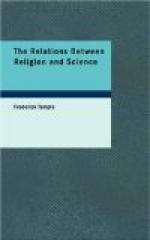It is then to the man, thus capable of appreciating a law superior in its nature to all phenomena and bearing within himself the conviction of a personal identity underlying all the changes that may be encountered and endured, that is revealed from within the command to live for a moral purpose and believe in the ultimate supremacy of the moral over the physical. The voice within gives this command in two forms; it commands our duty and it commands our faith. The voice gives no proof, appeals to no evidence, but speaks as having a right to command, and requires our obedience by virtue of its own inherent superiority.
Its first command we call duty. The voice within awakes a peculiar sentiment which, except towards its command, is never felt in our souls, the sentiment of reverence. And it commands the pursuit of that, whatever it may be, to which this sentiment of reverence attaches. This is the positive test by which we are to know what is ever to be our highest aim. And along with this there is a negative test by which we are perpetually to correct the other, namely, the test of universality. The moral law in its own nature admits of no exceptions. If a principle of action be derived from this law it has nothing to do with time, or place, or circumstances; it must hold good in the distant future, in planets or stars utterly remote, as fully as it holds good now and here.
This duty we can subdivide under four heads, accordingly as we apply it to our dealings with ourselves, with other moral and spiritual beings, with other creatures that can feel pleasure and pain, with things that are incapable of either. If we are thinking of ourselves only, duty consists in the pursuit of holiness, that is, in the absolute subjection of what does not demand reverence to that which does. It is plain that what deserves reverence in us is that which approaches most nearly to the moral law in character. The appetites, the affections, the passions, have each their own separate objects. They may be useful in the highest degree, but they cannot in themselves deserve reverence, for their objects are not the moral law; they must therefore be absolutely subordinated to the will and the conscience which have for their objects the very law itself. Holiness consists in the subjection of the whole being, not in act alone, but in feeling and desire as well, to the authority of conscience.




